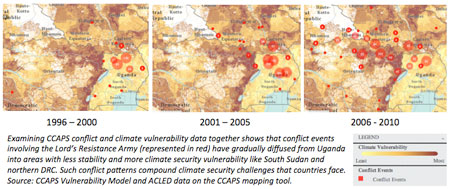Mapping Tool Analyzes How Climate Change, Conflict, and Aid Intersect
PRESS RELEASE
Washington, DC – March 2, 2012 – The Strauss Center’s Climate Change and African Political Stability (CCAPS) program has released the pilot version of its dynamic mapping tool. In partnership with AidData, CCAPS developed the online data portal to enable researchers and policymakers to visualize data on climate change vulnerability, conflict, and aid, and to analyze how these issues intersect in Africa.
“The complex pathways from climate change to security impacts have demanded new datasets to fill knowledge gaps, but also new ways of presenting the data to be of most use in policy planning,” said Francis J. Gavin, Director of the Strauss Center. “This mapping tool allows policymakers to analyze data from multiple sources at once, providing integrated analysis of the drivers and responses related to security risks stemming from climate change.”
The mapping tool, which uses Esri technology, allows users to select and layer any combination of CCAPS data onto one map to assess how myriad climate change impacts and responses intersect. For example, mapping conflict data over climate vulnerability data can assess how local conflict patterns could exacerbate climate-induced insecurity in a region. It also shows how conflict dynamics are changing over time and space.
How do conflict trends and chronic climate insecurity intersect in Central Africa?

“Climate change poses an enormous threat to the livelihoods and safety nets of millions of Africans. However the level of risk is not evenly spread and certainly doesn’t respect national boundaries,” said Jean-Louis Sarbib, CEO of Development Gateway. “To ask critical questions about how development assistance can reduce vulnerability, you need local data on climate, and also on aid-funded interventions. This is what the new CCAPS mapping tool shows in a digestible, interactive way. It will no doubt be a valuable new tool not only for researchers, but also policymakers, journalists, and citizens.”
To assess the interaction of climate vulnerability and international aid, users can locate aid projects funded by the 27 donors tracked in Malawi’s Aid Management Platform, layered on top of climate change vulnerability data. Mapping such aid flows provides a new way to discern if adaptation aid is effectively targeting the regions where climate change poses the most significant risk to the sustainable development and political stability of a country.
Where is development aid targeting areas with climate security risks?

“Being able to see in a map all the donor-funded activities in Malawi has transformed the way we think about development and positively helped our own planning effort,” said Hon. Ken Lipenga, Minister of Finance and Development Planning in Malawi.
The mapping tool is also a significant innovation in the context of the global aid transparency movement. It represents the first effort of the sort envisioned by the Open Aid Partnership, an initiative spearheaded by the World Bank to increase the openness and effectiveness of development assistance at the subnational level.
While the mapping tool is in its first stage of development, the next stage will convey a comprehensive picture of trends in Africa through the use of thematic mapping tools. Users will be able to access raw CCAPS data and use the mapping tool to combine CCAPS datasets with other organizations’ data to aggregate and disaggregate data in the way that is most useful to them. The thematic mapping tools will include data on:
- Climate Change Vulnerability: Users will visualize the different components of the CCAPS Vulnerability Model, using both historical and projected climate data for Africa.
- Conflict: Users will access the current Armed Conflict Location and Event Data, real-time ACLED conflict data updated weekly, and CCAPS’ Social Conflict and Africa Database.
- Adaptation Aid: In addition to the current development aid projects in Malawi, the mapping tool will include climate-coded aid projects in select countries and continent-wide data on adaptation aid.
- Governance: Users will access the first-ever continent-wide database classifying the political institutions in Africa on a spectrum of constitutional design, as well as data on governance quality and disaster management.
By integrating the various lines of CCAPS research, as well as other existing datasets, the CCAPS mapping tool aims to provide the most comprehensive view yet of climate change and security in Africa. CCAPS and AidData will release the thematic mapping tools throughout the spring and summer of 2012.
The current mapping tool is available through a user-friendly interface at www.strausscenter.org/ccaps/mappingtool.
###
AidData is a collaborative initiative to make information on development assistance more transparent and accessible. The AidData team works with a range of partners to geocode development activities, create data visualizations, and explore new ways to collect and standardize information about development projects around the world. AidData is a joint program of Development Gateway, Brigham Young University, and the College of William and Mary. For more information, visit www.aiddata.org.
Funded by the U.S. Department of Defense’s Minerva Initiative, the Strauss Center’s program on Climate Change and African Political Stability aims to assess where and how climate change poses threats to stability in Africa, develop strategies to build government capacity to respond, and evaluate the effectiveness of foreign aid for climate change adaptation in Africa. For more information, please visit http://ccaps.strausscenter.org.
Press Information
Contact: Emily Kallaur, Development Gateway
Tel: +1-202-572-9227
E-mail: ekallaur@developmentgateway.org
Share This Post
Related from our library

From Standardization to Specificity: Localizing Multi-Country Research
Multi-country research must balance consistency with local realities. While standardization allows reliable comparisons and generalizable insights, local context shapes outcomes. This blog explores how programs can strike that balance effectively.

Economic Toll of Tobacco-Related Diseases in Kenya: New Research Findings
Development Gateway: An IREX Venture (DG) is pleased to announce the publication of a research manuscript on the Economic Costs of Tobacco-Related Illnesses in Kenya. This research was carried out as part of the Tobacco Control Data Initiative (TCDI) activities in Kenya and is part of a broader report on Morbidity and Mortality from Tobacco Use in Kenya.

Unlocking Africa’s Agricultural Potential: Introducing the Soil Nutrient Roadmap
For over a decade, Development Gateway: An IREX Venture (DG) has been at the forefront of digital agriculture, leveraging agricultural data to support input monitoring, value chain analysis, and farmer-centric governance models. With funding from the Gates Foundation, DG is launching the Soil Nutrient Roadmap (SNR), a cutting-edge initiative using geospatial data to estimate current and future soil and crop nutrient requirements.